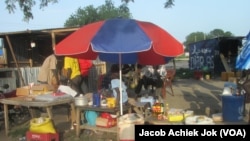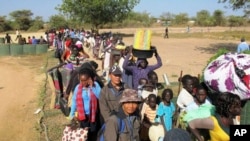BOR —
Nearly 100,000 people who fled Bor at the height of the fighting in South Sudan have returned in recent weeks, trying to rebuild lives in a city that is only a shadow of what it used to be.
“People are returning to their normal ways of living," Abraham Leek Mach, who returned to Bor two months ago, told South Sudan in Focus.
"Some people are just preparing their shops in Marol market ... some are constructing their houses in the town, trying to rebuild what they have lost,” he said.
Kon John Manyang, a student at Bor’s Malek Secondary School, was separated from his parents when the fighting that broke out in Juba in mid-December spread to other parts of the country, including the capital of Jonglei state.
Students like Manyang "don’t have parents to provide us with food," he said, and hoping "the government will let us be in school by providing us food and dormitories ... beds.”
Bor changed hands between pro- and anti-goverment forces several times during the fighting in South Sudan.
Tens of thousands of people caught in the midst of the clashes fled Bor and headed to Ethiopia or across the White Nile River into Lakes state.
Others sought shelter at the U.N. base in the town, which was attacked in April by an armed mob. Dozens of internally displaced persons sheltering inside the base were killed in the attack, which U.N. Secretary General Ban Ki-moon denounced as a war crime.
Still others were killed in their homes, in churches and in hospitals.
A U.N. official who visited Bor in January said that the town had been levelled in the fighting. The warring sides have swapped blame for destroying Bor.
But for the last few months, the town's mayor, Nhial Majak Nhial, says Bor has been peaceful and is undergoing something of a rebirth.
“Bor town has enjoyed stability for the last times three to four months now," Nhial said.
"We have received a huge influx of internally displaced people from Awerial county, Lakes state and other areas. This is a good sign that peace and stability are returning to the town of Bor," he said.
Aid agencies are supporting the returnees, many of whose homes were destroyed in the fighting in Bor, and the town is providing temporary accommodation to some returning residents while they rebuild their homes, Nhial said.
John Garang Ayii lost his collection of nearly 300 books when his house was burnt to the ground during the fighting. But, like other residents, he has come back and urged others to do the same.
“I am encouraging my fellow citizens of Bor County to come back from wherever they are -- whether in Guol-Yaar or in Uganda or in Kenya -- to come back because there is no security threat as per now," he said.
Authorities say that with the return to the town of around 98,000 people who fled during the fighting, the population of Bor has swelled to around 140,000 people. But that is still only about half the town's pre-conflict population, they say.
“People are returning to their normal ways of living," Abraham Leek Mach, who returned to Bor two months ago, told South Sudan in Focus.
"Some people are just preparing their shops in Marol market ... some are constructing their houses in the town, trying to rebuild what they have lost,” he said.
Kon John Manyang, a student at Bor’s Malek Secondary School, was separated from his parents when the fighting that broke out in Juba in mid-December spread to other parts of the country, including the capital of Jonglei state.
Students like Manyang "don’t have parents to provide us with food," he said, and hoping "the government will let us be in school by providing us food and dormitories ... beds.”
Bor changed hands between pro- and anti-goverment forces several times during the fighting in South Sudan.
Tens of thousands of people caught in the midst of the clashes fled Bor and headed to Ethiopia or across the White Nile River into Lakes state.
Others sought shelter at the U.N. base in the town, which was attacked in April by an armed mob. Dozens of internally displaced persons sheltering inside the base were killed in the attack, which U.N. Secretary General Ban Ki-moon denounced as a war crime.
Still others were killed in their homes, in churches and in hospitals.
A U.N. official who visited Bor in January said that the town had been levelled in the fighting. The warring sides have swapped blame for destroying Bor.
But for the last few months, the town's mayor, Nhial Majak Nhial, says Bor has been peaceful and is undergoing something of a rebirth.
“Bor town has enjoyed stability for the last times three to four months now," Nhial said.
"We have received a huge influx of internally displaced people from Awerial county, Lakes state and other areas. This is a good sign that peace and stability are returning to the town of Bor," he said.
Aid agencies are supporting the returnees, many of whose homes were destroyed in the fighting in Bor, and the town is providing temporary accommodation to some returning residents while they rebuild their homes, Nhial said.
John Garang Ayii lost his collection of nearly 300 books when his house was burnt to the ground during the fighting. But, like other residents, he has come back and urged others to do the same.
“I am encouraging my fellow citizens of Bor County to come back from wherever they are -- whether in Guol-Yaar or in Uganda or in Kenya -- to come back because there is no security threat as per now," he said.
Authorities say that with the return to the town of around 98,000 people who fled during the fighting, the population of Bor has swelled to around 140,000 people. But that is still only about half the town's pre-conflict population, they say.






